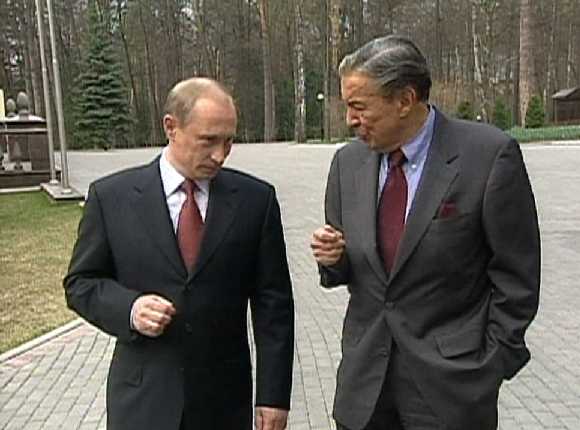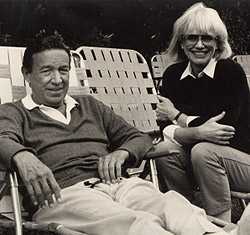|
Mike Wallace: Probing the Inner Depths
By Eve Berliner |
|||
|
CBS Wallace's May 2005 coup, a one-on-one with Russian President Vladimir Putin.
|
Mike and Mary Wallace |
||
|
By Eve Berliner
Beneath the brash, unnerving persona, the master of the jugular who has raised intimidation to an art form, lies a more hidden man, a man of scars and storms and deep black melancholies. The death of his 19-year-old son, Peter, who fell to his death off a cliff in Greece in 1962 on summer holiday from Yale; it was his father who found the body, flying to Europe and retracing the arduous climb up the mountain after the sudden cessation of letters began to cause concern. Scars on his face -- vestiges of acne inflamed lesions that drove him from the adolescent world in torment -- and scars on his soul, the loss of his son precipitating a transmutation within, a self-searching that changed the course of his life and turned him into a newsman. They call it "ambush journalism," the victim a cornered rat, Mike Wallace, enemy combatant, his senses keen, his eyes transfixed, looking for the opening, going in for the kill, the camera recording it all; the camera is power. He is among the most formidable figures in the history of television, tough, probing interviews with those who have shaped history and moved the world: leaders, liars, scoundrels, thinkers, decades of presidents: John F. Kennedy, Lyndon Baines Johnson, Richard Nixon, Gerald Ford, Jimmy Carter, Ronald Reagan, George H.W. Bush, and a vast number of powerful international figures: Deng Xiaoping, the Ayatollah Khomeini, Menachem Begin, Anwar el-Sadat, Yasir Arafat, the Shah of Iran, King Hussein, Hafez Assad, Muammar Qaddafi, Kurt Waldheim, and including Watergate rascal [whom CBS paid the sum of $100,000] H.R. Haldeman. The great artists have gravitated to his charms: Leonard Bernstein, Vladimir Horowitz, Itzhak Perlman, Mikhail Baryshnikov and the reclusive, rarely interviewed Johnny Carson. Among more recent coups, Russian President Vladimir Putin, Nation of Islam suspected assassin/conspirator Louis Farrakhan in joint interview with Atallah Shabazz, daughter of Malcolm X, and an on-camera assisted suicide intervention by Jack Kevorkian, now in prison. Manuel Noriega has called him "the epitome of sabotage journalism." Myron Leon Wallace, born in Brookline Massachusetts to immigrant parents, a "gentleman's B minus student," captain of the tennis team, first violinist of the high school orchestra, found his true calling when he walked into the campus radio station at the University of Michigan in Ann Arbor and was instantly overcome. "I didn't know how I was going to make it, but I knew damn well what I was going to be," he commented. His career in radio broadcasting began in 1939 as a newscaster for WXYZ, Detroit, which broadcast The Green Hornet and other popular radio dramas, a fortuitious event for Mike who became the program's narrator, and with his deep mellifluous baritone intoned the opening dialogue for The Green Hornet as follows: "On police records, a wanted criminal, Green Hornet is really Britt Reid, owner/publisher of the Daily Sentinel, his dual identity known only to his secretary and the District Attorney. And now, to protect the rights and lives of decent citizens RIDES THE GREEN HORNET!" [The character may perhaps have had more subterranean psychological impact on Wallace than he recognized as he himself went on to protect decent citizens from the corrupt and vile forces of society. The Green Hornet rides again!] There were years of radio jobs and with the rise of television in the early 1950's Mike became a familiar personality hosting news, quiz and interview programs, game shows, becoming a pitchman for cigarettes, creating a variety show with his second wife called Mike and Buff, and writing a column for the New York Post. In 1954, he did a brief stint on Broadway as an actor but immediately returned to broadcasting .
It was Dumont network producer Ted Yates who would create the vehicle that shot MikeWallace to prominence in 1956 with Night Beat, a live, late-hour interview show in which two guest celebrities were placed under the harsh klieglight of Wallace's interrogations. For the first time in television, Wallace cast aside the usual pandering, simplistic, pot boiler questions, and let loose with abrasive, bruising inquisitions of well known guests. His researches were in-depth and intrusive. His guests loved it and feared it. With only a black backdrop and smoke from his cigarette for atmosphere, the hunter asked the provocative question and the prey squirmed in tight close-up, sweaty shots. Among his combatants: Norman Mailer, Salvador Dali, Thurgood Marshall, Hugh Hefner, William Buckley and an assortment of ex-mobsters, Klansmen and movie stars. Nightbeat subsequently moved to ABC and became The Mike Wallace Interviews, the program coming to an end in 1958 after ABC's brushes with libel suits and fears of Wallace brinksmanship called a halt to the enterprise.
The shadow of legal action has hovered over this reporter. More recently, in 1994, taking on Big Tobacco in the Jeffrey Wigand/Brown & Williamson expose, the rug pulled out from under by CBS management, who caved in at the prospect of a $15 billion lawsuit. It was Wallace's interview with General William C. Westmoreland in the explosive 1982 CBS special, "The Uncounted Enemy: A Vietnam Deception" that would trigger his first precipitous plunge into the abyss of clinical depression. Westmoreland sued CBS and Wallace for libel. In what was a promotional ad for the documentary, CBS had charged "a conscious effort -- indeed a conspiracy at the highest levels of military intelligence -- to suppress and alter critical intelligence on the enemy in the year leading up to the Tet offensive" and depicted General William C. Westmoreland, the commander of American forces in Vietnam, at the center of that "conspiracy." It was the word "conspiracy" that would prove to be the unsettling factor for CBS. In fact, the word "conspiracy" was never used in the broadcast by Wallace. In the end, the case was settled out of court in February 1985 after a five month legal battle which left factual issues unresolved and both sides claiming victory. Westmoreland dropped the charges and dropped the case. But for Wallace, the stentorian voice of truth and justice, the ordeal took a searing toll on his emotional health. His integrity had been publicly impugned. He had become the focus of ambush interviews outside the courtroom. The cut-throat $120 million libel suit had sucked his strength. He sought psychiatric help. "You know something, Mr. Wallace, what you're worried about is that you're going to have to answer the kind of questions that you like to ask," his psychiatrist noted wryly and astutely. The realization of fragility is with him now. He has struggled with three serious episodes of deep depression over the years, black moods of hopelessness and despair which have escalated to thoughts of suicide. He has survived and conquered through the utter devotion of his wife, Mary, who has stood beside him, there for him, given everything in her; his friends, the Blues Brothers, Art Buchwald and William Styron, all three sufferers; and, of course, the remarkable pharmaceutical advances in the new age of antidepressants. He is not an easy man, a creature of narcissism and fierce tempers, arrogance and ego. Four marriages, his sole surviving son, Chris Wallace, an aggressive and sharp-edged reporter and host of Fox News Sunday, in the tough tradition of his father. He is in his 87th year now. The clock ticks for Mike Wallace. Thirty-seven years with 60 Minutes, there from its inception on September 24, 1968, when it premiered with two correspondents, Harry Reasoner and Mike Wallace, said to be cutting back on the work load this year, as he says every year. In the end, he's still in there grappling for the Big Interview, the next great expose, the next great confrontation in the search to unearth the truth, shine the light of revelation on the hidden darkness of power and corruption. table of contents
|
|||

